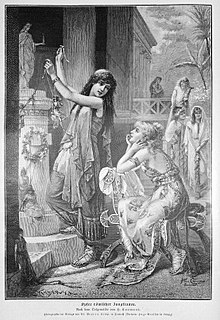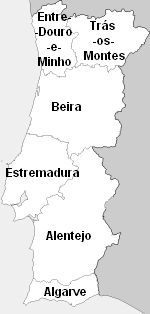This page is based on this
Wikipedia article Text is available under the
CC BY-SA 4.0 license; additional terms may apply.
Images, videos and audio are available under their respective licenses.

The Germanic peoples are an Indo-European ethnolinguistic group of Northern European origin identified by their use of the Germanic languages. Their history stretches from the 2nd millennium BCE up to the present day.

Paganism, is a term first used in the fourth century by early Christians for people in the Roman Empire who practiced polytheism. This was either because they were increasingly rural and provincial relative to the Christian population, or because they were not milites Christi. Alternate terms in Christian texts for the same group were hellene, gentile, and heathen. Ritual sacrifice was an integral part of ancient Graeco-Roman religion and was regarded as an indication of whether a person was pagan or Christian.

The Lusitanians were an Indo-European people living in the west of the Iberian Peninsula prior to its conquest by the Roman Republic and the subsequent incorporation of the territory into the Roman province of Lusitania.
The Interamici were an pre-Roman people of unknown ethnic, living in the north of modern Portugal, in the province of Trás-os-Montes, near the border with Galicia (Spain).
The Narbasi were an ancient Celtic tribe of Gallaecia, living in the province of Minho and nearby areas of modern Galicia (Spain).

The Italic peoples were an Indo-European ethnolinguistic group identified by their use of Italic languages.

Hispania Citerior was a Roman Province in Hispania during the Roman Republic. It was on the eastern coast of Iberia down to the town of Cartago Nova, today's Cartagena in the autonomous community of Murcia, Spain. It roughly covered today's Spanish autonomous communities of Catalonia and Valencia. Further south there was the Roman Province of Hispania Ulterior, being further away from Rome. The two provinces were formed in 197 BC, four years after the end of the Second Punic War. During this war Scipio Africanus defeated the Carthaginians at the Battle of Ilipa in 206 BC. This led to the Romans taking over the Carthaginian possessions in southern Spain and on the east coast up to the River Ebro. Several governors of Hispania Citerior commanded wars against the Celtiberians who lived to the west of this province. In the late first century BC Augustus reorganised the Roman provinces in Hispania and Hispania Citerior was replaced by the larger province of Hispania Tarraconensis, which included the territories the Romans had conquered in central, northern and north-western Hispania. Augustus also renamed Hispania Ulterior Hispania Baetica and created a third province, Hispania Lusitania.

The Bastetani or Bastuli were an ancient Iberian (pre-Roman) people of the Iberian peninsula. They are believed to have spoken the Iberian language.
The Ausetani were an ancient Iberian (pre-Roman) people of the Iberian peninsula. They are believed to have spoken the Iberian language. They lived in the eponymous region of Ausona and gave their name to the Roman city of Ausa.
The Ilergetes were an ancient Iberian (Pre-Roman) people of the Iberian peninsula who dwelt in the plains area of the rivers Segre and Cinca towards Iberus (Ebro) river, and in and around Ilerda/Iltrida, present-day Lleida/Lérida. They are believed to have spoken the Iberian language.
The Laietani were an ancient Iberian (Pre-Roman) people of the Iberian peninsula. They inhabited the area occupied by the city of Barcelona. One of the main thoroughfares of the city, Via Laietana, is named after the Laietani. They are believed to have spoken an Iberian language.

The Cessetani were an ancient Iberian (Pre-Roman) people of the Iberian peninsula. They are believed to have spoken the Iberian language. Their territory extended along the coast between the Coll de Balaguer and the Garraf Massif and was limited in the west by the Prades Mountains.

The Ilercavones were an ancient Iberian (Pre-Roman) people of the Iberian peninsula. They are believed to have spoken an Iberian language.

The Edetani were an ancient Iberian (Pre-Roman) people of the Iberian peninsula. They are believed to have spoken a form of the Iberian language.
The Bletonesii were one of the pre-Roman Celtic peoples of the Iberian Peninsula, dwelling around the city of Bletisa or Bletisama, located in modern Ledesma in the province of Salamanca, Spain. They were punished by the Romans for practicing human sacrifice. If the placement in Bletisa is correct, they lived near the Vettones.
The Lacetani were an ancient Iberian (pre-Roman) people of the Iberian peninsula. They are believed to have spoken an Iberian language.
The Celtici Praestamarici were an ancient Gallaecian Celtic tribe, living in the west of modern Galicia, in the Barbanza's county.
The Baedi were an ancient Gallaecian Celtic tribe, living in the north of modern Galicia, in the Betanzos's county.

The Sedetani were an ancient Iberian (Pre-Roman) people of the Iberian peninsula. They are believed to have spoken a form of the Iberian language.












